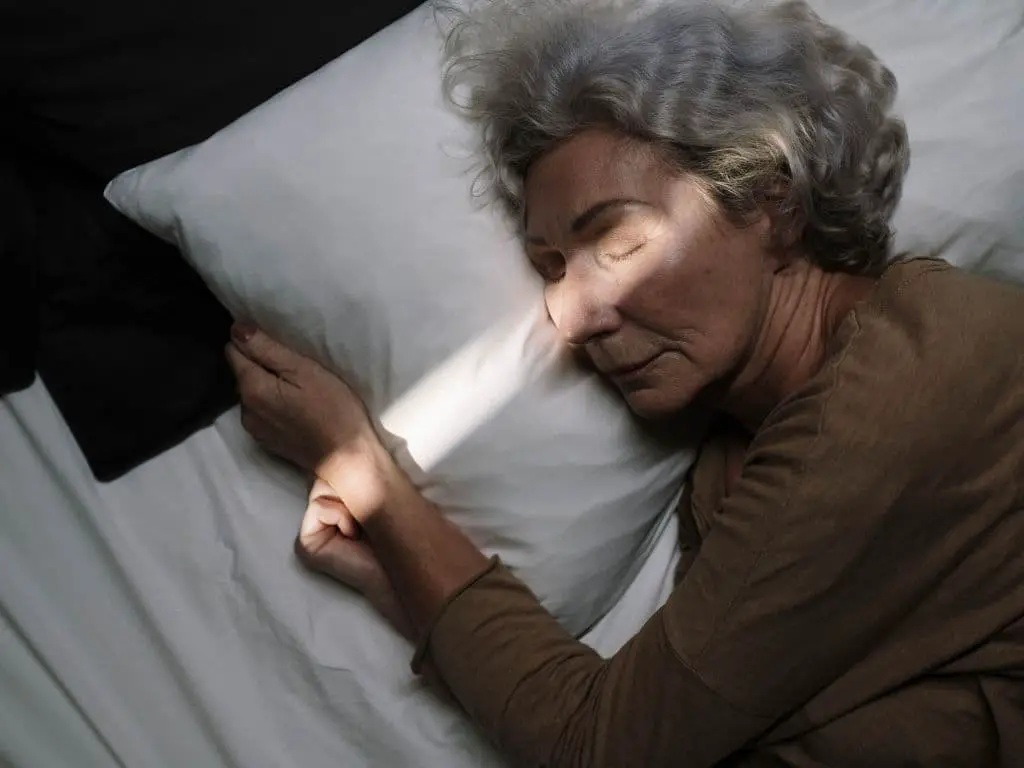Why Does My 96 Year Old Mother Sleep All the Time?
It’s common for seniors to experience some changes in their sleep patterns as they age. However, excessive daytime sleeping can be troubling for elderly individuals and their caregivers.
Why does my 96 year old mother sleep all the time? Your 96-year-old mother may sleep a lot due to factors like aging-related changes in sleep patterns, health conditions like nocturia, sleep apnea, restless leg syndrome, depression, and dementia. Certain medications, chronic pain, loneliness, or boredom can also contribute to excessive daytime sleepiness. It’s advisable to consult with a healthcare professional to address these issues effectively.
There are many potential causes of daytime fatigue and increased napping in older adults. By understanding the factors that influence sleep changes in seniors, we can better address problematic daytime drowsiness.

What are the Normal Sleep Patterns for Seniors?
Like younger adults, seniors go through predictable stages of sleep during their nightly rest. However, aging affects the quality and duration of these sleep stages. As people get older, the time spent in deep, restorative sleep decreases. Seniors also tend to have more nighttime awakenings and less ability to remain asleep. These disruptions mean the elderly receive less sleep overall.
Aging brings many changes that contribute to sleep disturbances in seniors. Conditions like arthritis can cause discomfort and pain that disrupt sleep. Older adults also frequently contend with nocturia, needing to wake several times a night to urinate. Moreover, seniors produce less melatonin, which regulates sleep-wake cycles. As a result, they often struggle with insomnia and have difficulty falling and staying asleep.
Why Do Seniors Experience Excessive Daytime Sleepiness?
Sleep apnea causes people to stop breathing briefly and repeatedly during sleep, resulting in frequent awakenings. Restless leg syndrome also interrupts sleep with unpleasant sensations that compel leg movement. Both conditions are more common in seniors. The constant nighttime interruptions lead to daytime sleepiness.
Frequent nocturia forces seniors out of bed multiple times per night. Older women also commonly experience night sweats due to hormonal changes of menopause. These nighttime awakenings prevent seniors from getting sufficient uninterrupted sleep, leaving them fatigued and needing daytime naps.
Some seniors with dementia experience increased agitation and restlessness in the late afternoon and evening, known as sundowning. The resulting lack of sleep at night leads them to sleep more during the day to compensate. Managing sundowning can improve nighttime sleep quality.
How Can Depression and Dementia Affect Sleep in Seniors?
Depression often presents differently in seniors than younger people. Irritability, fatigue, and sleep disturbances may indicate depressive disorder in the elderly. Since depression affects energy levels and motivation, depressed seniors tend to spend more time sleeping and withdraw from social interactions. Treating the underlying mood disorder can reduce excessive sleeping.
Seniors with Alzheimer’s disease and other types of dementia frequently experience disrupted sleep-wake cycles. Confusion about day versus night leads many to sleep more during the day. Sundowning and medications used to manage behaviors in dementia can also negatively impact sleep. Supportive routines are important for encouraging better sleep.
How Do Medications Influence Sleep in Seniors?
Seniors often take multiple prescription and over-the-counter medications for various health conditions. However, these drugs frequently have side effects like drowsiness, dizziness, and fatigue. The more medications a senior takes, the higher their risk of sleep disturbances from medication interactions.
Doctors can adjust medication regimens and timing of doses to minimize daytime sleepiness. Lowering doses or discontinuing certain drugs may help as well. Caregivers can ask pharmacists to review all of a senior’s medications to identify any that could be causing excessive drowsiness. This comprehensive approach improves overall sleep quality.
What are the Common Medical Conditions that Cause Sleep Problems in Seniors?
Many seniors live with chronic conditions like arthritis that cause persistent pain. This discomfort can make it very difficult to fall and stay asleep at night. The resulting fatigue leads seniors to sleep more during the day in an attempt to catch up on rest. Managing pain through treatment, physical therapy, and assistive devices can improve sleep.
When seniors lack stimulation and social connections, they can fall into patterns of sleeping away large portions of the day out of boredom and loneliness. Building physical activity, social engagement, and meaningful routines into each day prevents excessive sleepiness by reducing boredom and feelings of isolation.
How Can We Improve Sleep Quality in Seniors?
Encouraging movement and limiting long naps helps seniors feel less sleepy during the day. Establishing a relaxing bedtime routine, limiting caffeine, and maximizing daylight exposure also improve sleep quality. Nightlights, elevated toilet seats, and grab bars can reduce disruptive nighttime awakenings.
Involving seniors in social activities, volunteer work, or health and wellness programs can give them a sense of purpose and community. This helps minimize boredom and loneliness that contribute to sleeping all day. Companionship and intergenerational connections are especially beneficial.
What Resources are Available for Caregivers of Seniors with Sleep Problems?
Adjustable beds, CPAP machines, and avoiding alcohol before bedtime are helpful strategies for managing sleep apnea. Caregiver support groups provide a venue to learn from others’ experiences. Doctors and sleep specialists can also provide guidance on improving seniors’ sleep.
Consistency, activity during the day, and good lighting at night aid seniors with dementia who have irregular sleep patterns. Caregiver counseling provides coping strategies for sleep issues. Respite care offers short breaks that help avoid caregiver burnout when rest is lacking.
Conclusion
Sleep changes are common in seniors, but excessive daytime sleeping can negatively impact health and quality of life. By understanding the potential causes of sleep issues in the elderly, caregivers can work with medical providers to improve nighttime sleep quality and promote healthy daytime alertness through social connections, activity, and routine. Support services for both caregivers and seniors provide additional help addressing problematic sleepiness in aging loved ones.
Frequently Asked Questions
-
Why does my 96 year old mother sleep all the time?
Excessive daytime sleep can often be caused by boredom, depression and/or chronic pain. Problems with medication can also arise.
-
Why do elderly people sleep so much?
Excessive daytime sleepiness in older adults is a sign that there may be an underlying condition. An older adult’s excessive daytime sleepiness could be due to sleep apnea or cognitive impairment.
-
Why do elderly eat so little?
Changes in the body’s physiological system as a result of ageing can lead to decreased appetite. Declining appetite can be caused by changes in the digestive system.
-
What are 3 of the obstacles senior citizens face when it comes to eating healthy?
The loss of muscle tone may make swallowing or chewing more difficult. Bad dentures and dental issues can cause discomfort or make it difficult to eat. Many people over 65 are taking medications that can alter the taste of food.
-
What is the most common cause of weight loss in the elderly?
Intentional weight loss among people over 65 is linked to increased mortality and morbidity. Malignancy, nonmalignant gastro disease and mental disorders are the most frequent causes.
-
Why do the elderly get so tired?
Some seniors experience fatigue from side effects of medications and medical treatment. Your aging family member could also be experiencing fatigue from lifestyle choices. Fatigue can be caused by a combination of too little or too much exercise.
-
How long can a 90 year old live without food?
People may be curious about how long someone could live in hospice without eating. Patients can become ill as soon as they stop eating. This period of time without eating is usually about 10 days. However, in some rare cases, it may last for several weeks.
-
What is the best food for seniors?
Protein (lean meats (fish, lean meats), eggs, beans, fruits and vegetables) Whole grains (brown rice and whole wheat pasta). Low-fat dairy (milk, and its substitutes)
-
How much should an elderly person eat?
Foley says that for seniors it is better to have five to six smaller meals per day. This helps with breathing issues and chest congestion. This reduces insulin spikes and crashes.
-
What causes rapid weight loss in elderly?
Weight loss is a leading cause of death in seniors due to heart disease, stomach disorders and cancer. A decrease in body mass is caused by poor circulation. This happens because the heart can’t pump or deliver nutrients efficiently to different parts of the body.
-
What hospice does not tell you?
Hospice is not designed to speed death or help people die. Hospice services can sometimes make patients live longer than they expected. Hospice is all about relieving the suffering of a terminal patient.
-
Is it normal to lose your appetite as you get older?
A gradual decline in appetite is often considered normal as part of aging. The elderly have lower energy and are more likely to be active, so they need fewer calories than younger people.
-
Is it normal for elderly to lose appetite?
It’s common to eat less due to physical changes as we age. Naturally fluctuating hormone levels can cause a decrease in appetite. Alternate adults may need to adjust their diets when they are taking medications or dentures.
-
What should elderly avoid eating?
Salty foods and beverages should be limited. Don’t salt foods or drinks at the table. Avoid sugary drinks such as sugar-sweetened soft drink cordials and confectionery and fruit drinks. Limit alcohol
-
How often should elderly eat?
You can eat smaller meals and have more nutritious snacks between. Eat at least 3 times per day. It’s possible to not feel like cooking, so consider buying ready-made tinned or chilled meals.







